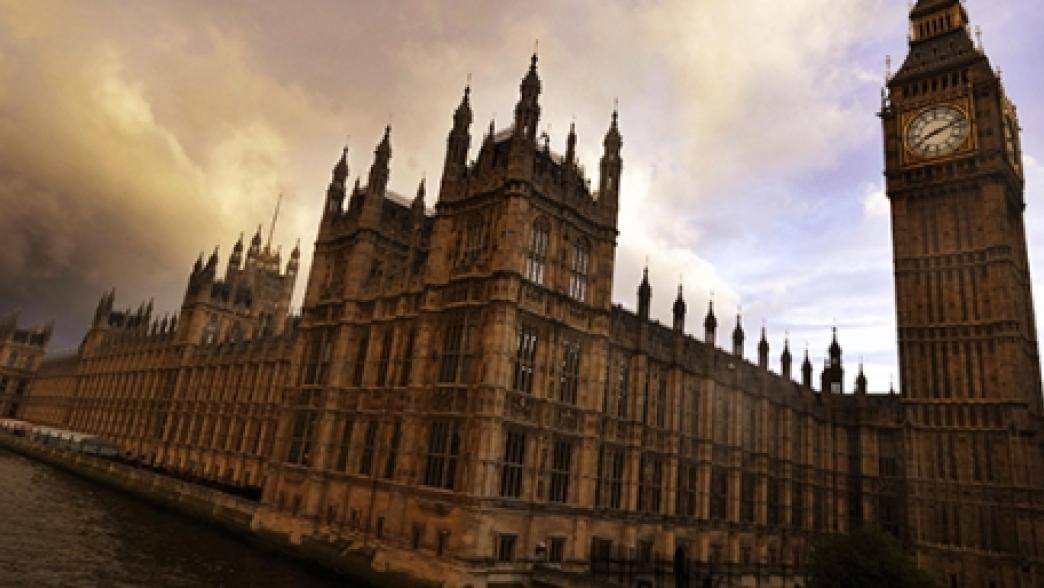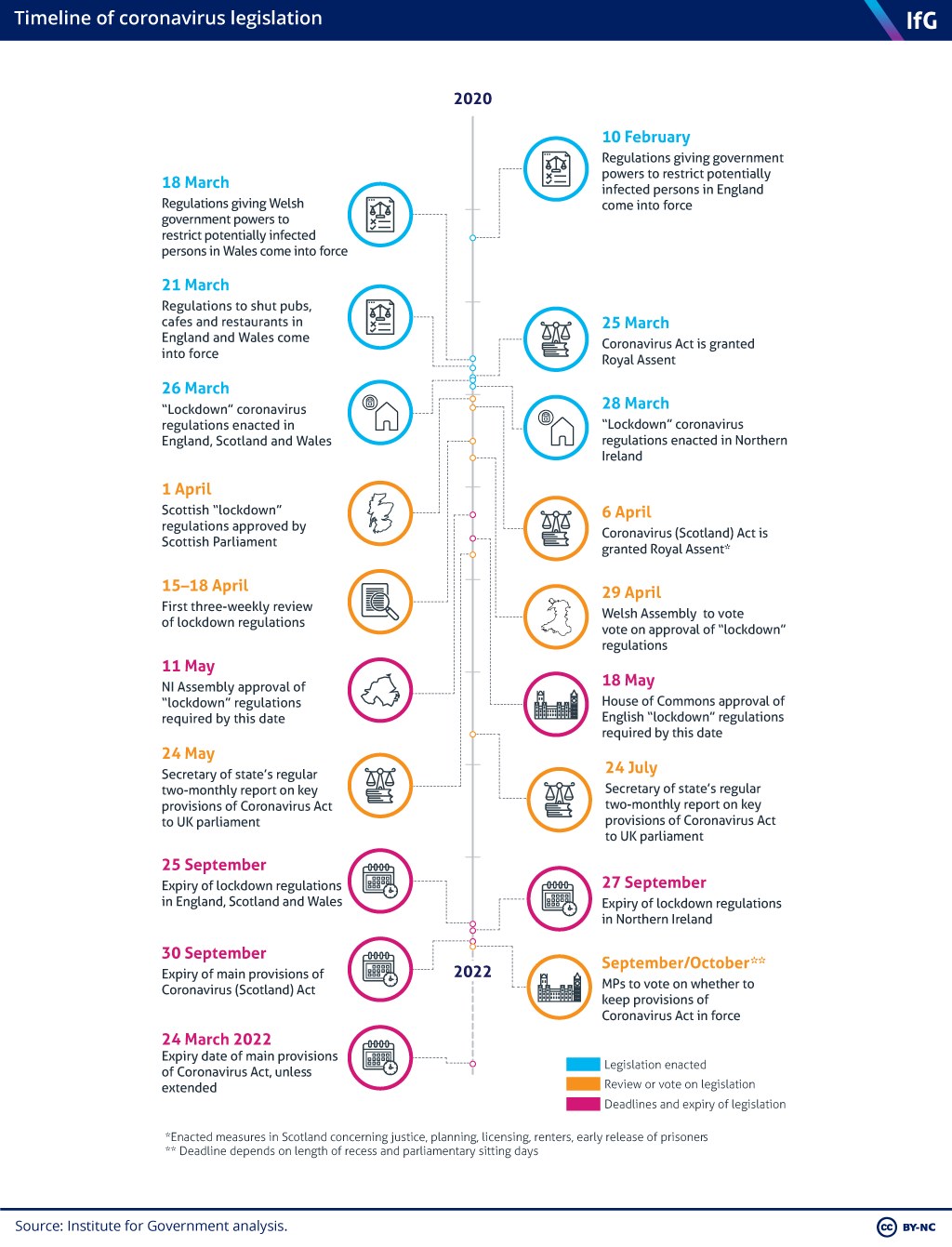Legislation to manage the coronavirus pandemic
The UK and devolved governments have regulations under existing public health legislation.

What legislation has been used to respond to the pandemic?
The most important new pieces of legislation underpinning the UK and devolved governments’ response to the coronavirus pandemic are:
-
The Coronavirus Act, a UK-wide act which was granted Royal Assent on 25 March;
-
Regulations enacted by the UK, Scottish and Welsh ministers on 26 March, and Northern Irish ministers on 28 March.
- The separate Coronavirus (Scotland) Act, which was passed by the Scottish Parliament on 1 April and was granted Royal Assent on 6 April.
The UK and devolved governments have regulations under existing public health legislation. In England and Wales, regulations have been made under the Public Health (Control of Disease) Act 1984 (as amended by the Health Protection Act 2008). In Northern Ireland, the Public Health Act (Northern Ireland) 1967. In Scotland, the Public Health etc. (Scotland) Act 2008.
The government has so far not made use of powers under the Civil Contingencies Act 2004, which provides a framework for responding to emergencies.
What does the Coronavirus Act do?
A full overview of the Coronavirus Act is available here. The Act has three main functions:
-
To give further powers to the government to slow the spread of the virus.
-
To reduce the resourcing and administrative burden on public bodies.
- To limit the impact of potential staffing shortages on the delivery of public services.
To slow the spread of the virus, the Act made amendments to public health legislation in Scotland and Northern Ireland, allowing ministers to create regulations to restrict public gatherings and individuals’ freedom of movement. Although public health is a devolved matter, the UK parliament legislated on health matters on behalf of the devolved legislatures with their consent.
What do the regulations enacted on 26 and 28 March do?
The regulations provide the powers to enforce the “lockdown” of the country to slow the spread of the Covid-19 virus. They require the closure of restaurants, cafes, bars and some other businesses, prohibit anyone from leaving their home without a reasonable excuse, and ban gatherings of more than two people.
Amendments to the regulations, which came into force in England on 22 April and in Wales on 25 April, prohibited anyone from leaving or being “outside of” home without a reasonable excuse.”
What provisions are in place for the UK and devolved parliaments to scrutinise and review the Coronavirus Act?
Every two months, the UK secretary of state must report to the House of Commons on the status of the non-devolved provisions of the main part of the Act. The report must specify the provisions in the Act that are in force, and which provisions have been brought into force in the previous two months. The secretary of state must present the first report to the House of Commons by 24 May.
Every six months, the secretary of state must, so far as practicable, allow the House of Commons a vote on whether the non-devolved powers that are in force should continue. If the House of Commons votes not to renew some or all of the powers, the UK government has 21 days to make regulations to terminate their use.
The precise deadline for the vote on the provisions of the Coronavirus Act depends on whether the House of Commons is in recess for the party conferences. The vote must be held within seven sitting days of six months after the Act received Royal Assent. This will fall in either September or October 2020.
There is no equivalent requirement for the devolved administrations to report every two months to the devolved legislatures on their use of powers under the Coronavirus Act. Neither is there a requirement for the devolved legislatures to vote after six months on whether the devolved administrations should switch off relevant provisions.
The main provisions of the Coronavirus Act expire after two years, on 24 March 2022, unless they are extended.
What provisions are in place to scrutinise the “lockdown” regulations?
The “lockdown” regulations are statutory instruments made by ministers in the four nations of the UK. They were subject to a ‘made affirmative’ procedure, meaning that were not scrutinised or voted on by the House of Commons or the devolved legislatures before they came into force.
However, the House of Commons and the devolved legislatures must give their approval to the relevant regulations within 28 days of their enactment, or they lapse. The 28-day period does not include days when the parliament or assembly is not sitting for more than four days.
In addition, ministers in all four nations must review the need for the restrictions and requirements in the regulations every 21 days. The first review took place on 15-18 March.
The Scottish Parliament approved the regulations for Scotland on 1 April. The Welsh Assembly is due to hold its vote on the regulations on 29 April. The Northern Ireland Assembly must vote on the regulations by 11 May and the House of Commons by 18 May.The regulations in all four nations expire six months after they come into force (25 September in England, Scotland and Wales; 27 September in Northern Ireland).
The Institute for Government has argued that the UK government and the Northern Ireland executive must, as a matter of priority, secure approval for the regulations from the House of Commons and Northern Assembly respectively when they return from recess. If the UK and devolved governments wish to extend or amend the regulations, they should consider introducing primary legislation authorising to do so.
What other legislation has been passed?
The Scottish parliament has passed its own primary legislation, the Coronavirus (Scotland) Act, which gained Royal Assent on 6 April. This enacted measures in Scotland concerning conducting court proceedings via video link; the early release of prisoners; planning and licencing regulations; protection for debtors; and, protection from eviction for tenants.
The main provisions of the Coronavirus (Scotland) Act expire on 30 September 2020.

- Keywords
- Parliamentary scrutiny
- Publisher
- Institute for Government